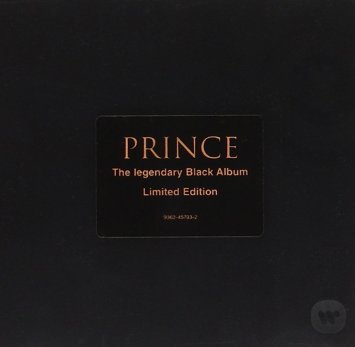
The Black Album (1994)

1. Le Grind
2. Cindy C
3. Dead On It
4. When 2 R In Love
5. Bob George
6. Superfunkycalifragisexy
7. 2 Nigs United 4 West Compton
8. Rockhard In A Funky Place
Every once in a while, an album arrives with more mythology than music. The Black Album is one of those cases. The story behind it has been repeated enough times that it practically overshadows the record itself—but in case you haven’t heard it, here’s the short version: Following the acclaim of 1987’s Sign ‘O’ the Times, Prince had planned to release this much funkier, darker, and allegedly more “street” follow-up just six months later. Then, right before its release, he pulled the plug.
Why? Depends on who you ask. Prince claimed a spiritual awakening led him to believe the album was “evil.” His label, on the other hand, didn’t seem too heartbroken. Maybe it was too soon for another Prince record. Maybe they didn’t hear an obvious hit single. Or maybe they were already lining up Lovesexy—which would arrive shortly after—as a more commercial alternative. Whatever the reason, The Black Album quietly slipped into legend, circulating only in bootlegs until an official release finally came in 1994, right in the middle of Prince’s public fallout with his record company.
So was it worth the wait? Well… yes and no. The Black Album is not some long-lost masterpiece—it doesn’t touch the heights of Sign ‘O’ the Times or 1999—but it’s still a strong, wildly funky record with more than its share of highlights. It’s raw, stripped down, and very much a party album. And as for the whole “evil” thing? Not really. It’s got a dirty mouth and a wink toward the bedroom, but that’s standard operating procedure for Prince. He was always a little torn between salvation and seduction, and this record just leans harder into the latter.
The best moments here are loud and proud: thick grooves, manic energy, and dancefloor-ready rhythms. It’s Prince having fun—slightly chaotic, maybe, but never boring. The one oddball inclusion is When 2 R in Love, a soft and sweet ballad that feels completely at odds with everything else. He later reused it on Lovesexy, and while it’s fine as a song, it brings the momentum here to a halt. You kind of wish he’d subbed in something more in keeping with the rest of the set, but clearly the idea was to preserve the album exactly as it was originally intended. Fair enough.
Of course, we have to talk about Bob George—the record’s most controversial and polarizing track. Even back in 1988, this would have raised eyebrows, but today it lands with a much heavier thud. Prince, using a distorted voice, plays the role of a violent, jealous boyfriend ranting about his girlfriend’s supposed affair with a guy who “manages that skinny motherf***er with the high pitched voice.” The beat is fierce, but the content is hard to defend. It’s a relic of a different time—and one that hasn’t aged gracefully.
The Black Album was never going to change the world, but in Prince’s catalog, it’s a fascinating detour. Funky, filthy, and fun in parts, it’s the kind of record that deserved better timing. By the time it finally got released, the buzz had dulled, and not as many people were paying attention. A shame, really. Had it come out when first planned, it might’ve been seen less as an afterthought and more as the punchy, playful oddity it actually is.
Go back to the main page
Go to the Next Review